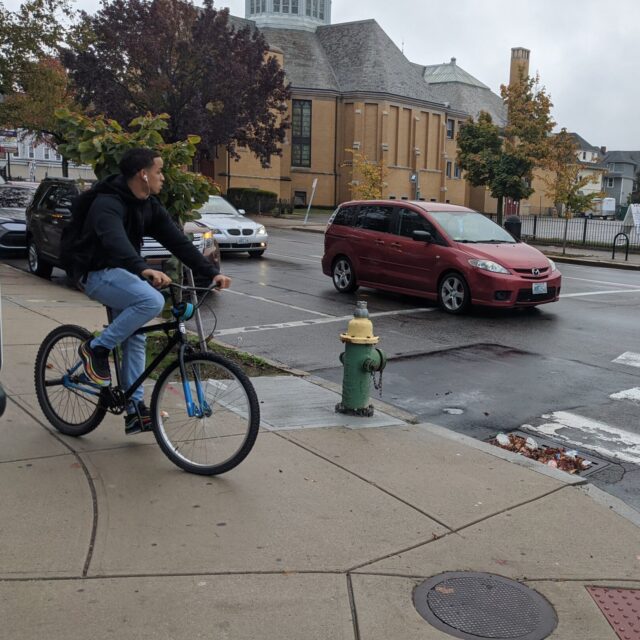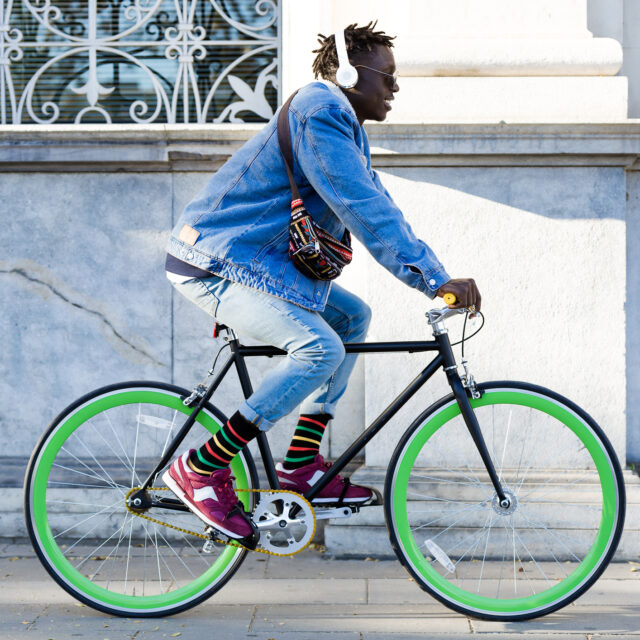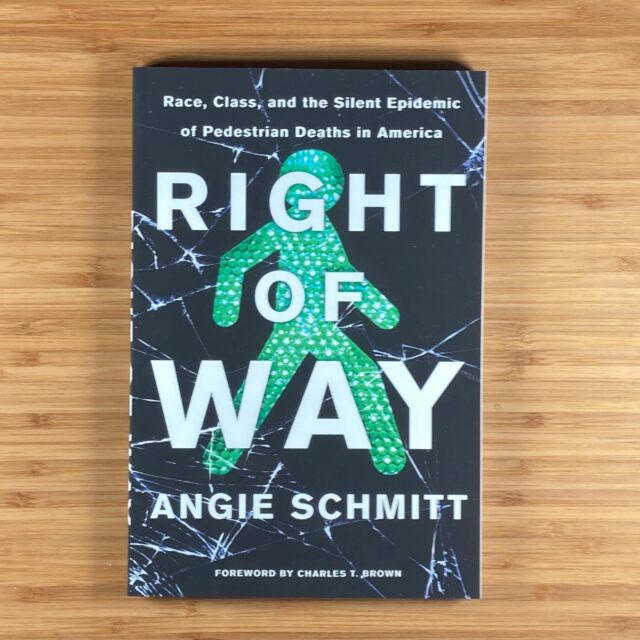New Podcast Alert: Arrested Mobility
by Kiran Herbert, Communications Manager
March 11, 2022
A new podcast from researcher Charles T. Brown discusses the connection between mobility and equity, and how the movement of marginalized communities is overly policed.
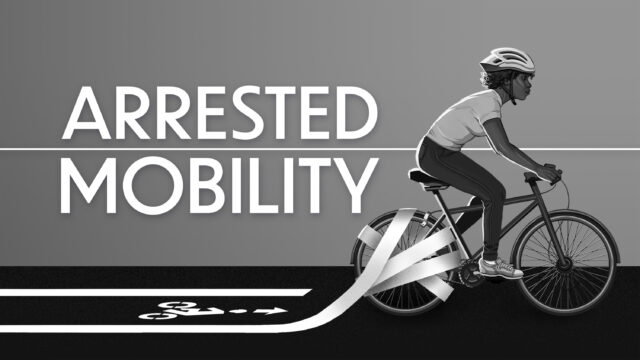
Photos courtesy of Charles T. Brown — please do not use them without his direct approval.
At the BBSP we’re big fans of Charles T. Brown, the founder and principal of Equitable Cities, and all the research he’s contributed to breaking down barriers to bicycling. For years, Brown has been publicly speaking about the concept of “Arrested Mobility,” which explores the adverse social, political, economic, and health outcomes of over-policing BIPOC movement in the U.S. Whether bicycling, walking, running, or driving, Black Americans and other minority populations, including unhoused individuals, are disproportionately the victims of overly aggressive police enforcement and brutality.
In a new podcast, also called “Arrested Mobility,” Brown explores whether this is by design, as well as what we can do to change the outcomes for BlPOC when they step outside their doors. The first episode is all about “Jaywalking,” something we’re all guilty of and often don’t think twice about. The 30-minute podcast, available on all the typical streaming platforms, showcases how while illegal in many places, jaywalking is inequitably enforced in areas with fewer sidewalks, signals, and pedestrian crossing areas.
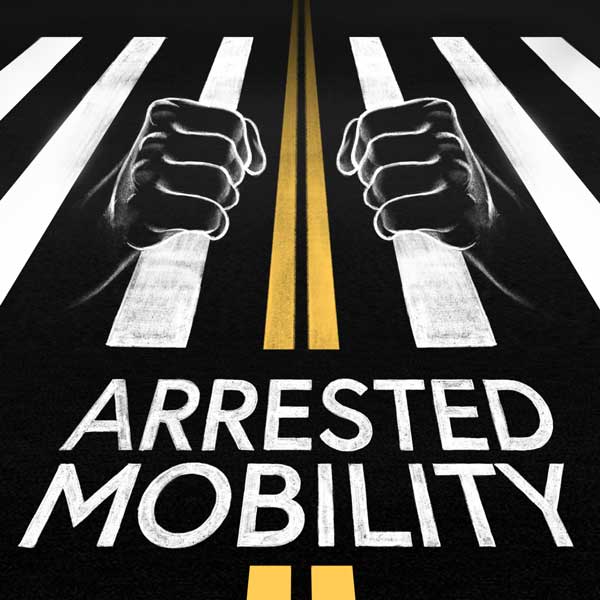 Podcast guest and author Angie Schmitt takes listeners through the history of jaywalking, and how from the beginning it was all about prioritizing the movement of cars above pedestrians. Today, the government Manual on Uniform Traffic Control Devices for Streets and Highways, or MUTCD, continues to make it onerous for cities to build safe pedestrian infrastructure — in effect, jaywalking is often illegal yet the way we’re forced to design cities ensures that it’s difficult for many, particularly underserved communities, to avoid. The first episode also discusses zoning, making a clear connection between discriminatory housing policy and arrested mobility. Brown excels at breaking down complex issues in an approachable way, pointing to current events — such as Philadelphia’s new law banning minor traffic stops — as concrete examples of what we can do to enact change.
Podcast guest and author Angie Schmitt takes listeners through the history of jaywalking, and how from the beginning it was all about prioritizing the movement of cars above pedestrians. Today, the government Manual on Uniform Traffic Control Devices for Streets and Highways, or MUTCD, continues to make it onerous for cities to build safe pedestrian infrastructure — in effect, jaywalking is often illegal yet the way we’re forced to design cities ensures that it’s difficult for many, particularly underserved communities, to avoid. The first episode also discusses zoning, making a clear connection between discriminatory housing policy and arrested mobility. Brown excels at breaking down complex issues in an approachable way, pointing to current events — such as Philadelphia’s new law banning minor traffic stops — as concrete examples of what we can do to enact change.
We talked to Brown briefly about his vision for the podcast and what’s to come.
Why did you create this podcast?
I coined the concept of Arrested Mobility to properly identify and diagnose a list of symptoms and conditions that were preventing Black people from being free in public space. Without the identification and diagnosis of it, the disease of Arrested Mobility would remain elusive and thus difficult to treat, control, or prevent. I created the Arrested Mobility Podcast to raise awareness of this disease, encourage policy, systems, and environmental changes, and ensure Black voices controlled the narrative around its impacts. To riff on what Congresswoman Ayanna Pressley said, I believe those closest to the pain or problem are closest to the solution.
Why is it important now, at this juncture in our history?
It has always been of utmost importance to me. As a Black “pracademic” and “street level researcher,” I’ve devoted my entire career to addressing injustices and inequities in our transportation system. I do it out of love for people, all people. The question is, why are other people just now starting to see how important this is?
It is important now because I want people to radically reconceptualize what it means to over-police a population and thus to see how inextricably linked policy, planning, policing, and polity are. But, make no mistake about it, those that cared most about equity and justice, cared before the murder of our dear brother George Floyd.
What do you hope to achieve?
I will encourage and lead a radical shift in the role of police in traffic safety enforcement throughout the world. Similarly, I will work with like-minded individuals and organizations across the world to remove or revise well-intentioned but disproportionately harmful state and municipal mobility policies. Finally, I will help cities create environments where Black people can move freely without fear of violence, intimidation, or discrimination.
In future episodes, we’ll highlight the importance of decriminalizing transportation and mobility for Black Americans, as well as share a plethora of new and innovative ways to do so through policy, systems and environmental changes, advancements in technology, and storytelling.
The Better Bike Share Partnership is funded by The JPB Foundation as a collaboration between the City of Philadelphia, the National Association of City Transportation Officials (NACTO) and the PeopleForBikes Foundation to build equitable and replicable bike share systems. Follow us on Facebook, Twitter and Instagram or sign up for our weekly newsletter. Got a question or a story idea? Email kiran@peopleforbikes.org.

